
Leadership turmoil, rumblings about an AI bubble, and a failed CEO coup last year didn't stop OpenAI from raising $6.6 billion.
On Wednesday, OpenAI completed its latest funding round according to the New York Times, giving it a valuation of $157 billion. That makes it the largest VC round of all time, a distinction that was previously held by Elon Musk's xAI, which raised $6 billion earlier this year.
The investment was led by VC firm Thrive Capital and included Microsoft, NVIDIA, Japanese tech investment company SoftBank, and United Arab Emirates investment company MGX. As confirmed in previous reports, Apple, which was rumored have backed out of investment talks with OpenAI is not an investor.
OpenAI's massive funding round caps off a raucous period of events over the past year or so. After it ignited the generative AI boom in 2022 with the launch of ChatGPT, OpenAI quickly became the latest Silicon Valley darling, earning $13 billion in investment from Microsoft. Then last November, a failed attempt by its non-profit board to oust CEO Sam Altman, revealed leadership's mistrust of Altman and differing philosophies from its co-founders. Eventually, co-founder Ilya Sutskever and, just last week, CTO Mira Murati quit the company. Co-founder and President Greg Brockman has taken a leave of absence and other executives have recently quit the company. OpenAI is also in the midst of restructuring its corporate status from non-profit to for-profit.
Despite waning investor interest, backlash from AI-weary consumers, and unfulfilled promises of AI's potential suggesting that the AI bubble might be ready to burst (or perhaps that it's slowly leaking after bursting months ago), OpenAI's funding round has proven investors with deep pockets are willing to bet on its success.
OpenAI makes money from subscriptions to its ChatGPT Plus, ChatGPT Enterprise, and API accounts. As of August, OpenAI reported that ChatGPT has over 200 million weekly users, which was double the amount of users in November, 2023, and expects to bring in $11.6 billion in sales next year (per CNBC). But building and maintaining AI models isn't cheap. According to The Information, OpenAI could lose up to $5 billion this year.

